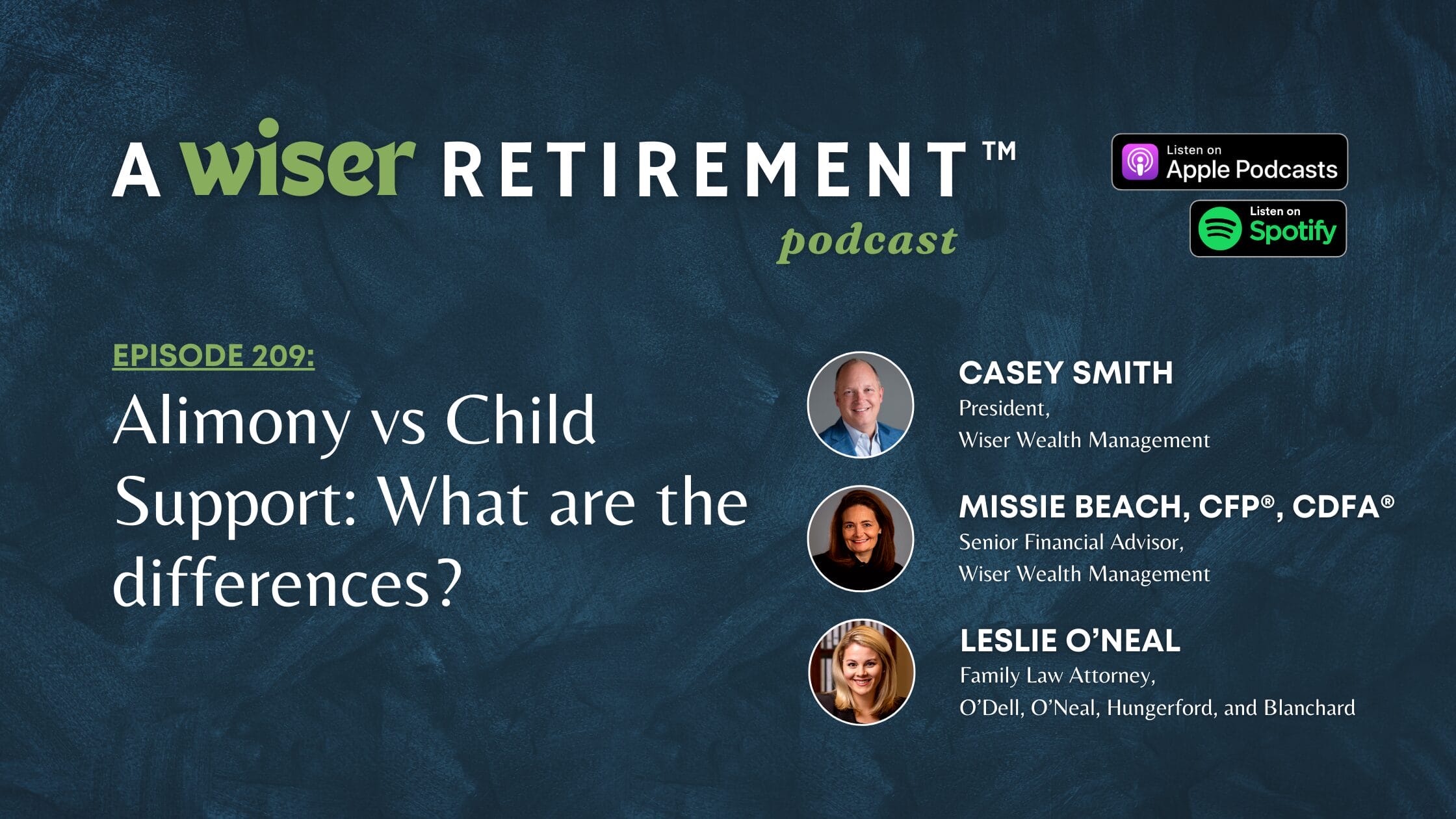
Alimony vs Child Support: What are the differences?
On this episode of A Wiser Retirement™ Podcast, Casey Smith and Missie Beach, CFP®, CDFA® are joined by guest, Leslie O’Neal, Family Law Attorney. They talk about the differences between alimony and child support, the factors that determine alimony, different types of alimony, and why alimony is not as common anymore.
Listen or Watch:
Summary
Determining Alimony Payments
Alimony can be a dicey concept, it is discretionary and dependent on the payor’s ability to pay and the receiver’s need. It’s decided by a judge and can depend on their interpretation of various factors like length of marriage, financial resources, and health of the parties. Negotiating alimony can be difficult, especially when households have limited disposable income and the costs of sustaining two separate households add up. It does not have a definitive end, except in cases where a court loses jurisdiction over the adult children. Overall, it is becoming less expected, especially if the recipient is able to work.
Determining Child Support Payments
Child support, on the other hand, is relatively straightforward and based on a formula using parents’ gross monthly incomes. The determination becomes more ambiguous when dealing with self-employed or parents pad via commission. Child support ends when a child turns 18 or when they graduate from high school, whichever comes sooner.
2 Types of Alimony
Rehabilitative alimony and lump sum alimony are two different types of alimony. Rehabilitative alimony is paid to allow one spouse to get back into the workforce, but it is awarded less frequently due to the increase in working women. Lump sum alimony is awarded instead of regular alimony payments, and it is less common.
Why is alimony not as common?
Alimony is becoming less expected as more women join the workforce and become financially independent. Forward-thinking judges are also a reason it is not awarded as often anymore.
Links:
- Click here to download one of our free guides that covers financial planning topics like retirement, investing, taxes, divorce, and more!
Connect:
- Click here to schedule a consultation with one of our financial advisors.
- Follow us on social media: Twitter, Instagram, Facebook, LinkedIn, and YouTube.
- Learn more about A Wiser Retirement™ podcast and access previous episodes.
Share This Story, Choose Your Platform!
Wiser Wealth Management, Inc (“Wiser Wealth”) is a registered investment adviser with the U.S. Securities and Exchange Commission (SEC). As a registered investment adviser, Wiser Wealth and its employees are subject to various rules, filings, and requirements. You can visit the SEC’s website here to obtain further information on our firm or investment adviser’s registration.
Wiser Wealth’s website provides general information regarding our business along with access to additional investment related information, various financial calculators, and external / third party links. Material presented on this website is believed to be from reliable sources and is meant for informational purposes only. Wiser Wealth does not endorse or accept responsibility for the content of any third-party website and is not affiliated with any third-party website or social media page. Wiser Wealth does not expressly or implicitly adopt or endorse any of the expressions, opinions or content posted by third party websites or on social media pages. While Wiser Wealth uses reasonable efforts to obtain information from sources it believes to be reliable, we make no representation that the information or opinions contained in our publications are accurate, reliable, or complete.
To the extent that you utilize any financial calculators or links in our website, you acknowledge and understand that the information provided to you should not be construed as personal investment advice from Wiser Wealth or any of its investment professionals. Advice provided by Wiser Wealth is given only within the context of our contractual agreement with the client. Wiser Wealth does not offer legal, accounting or tax advice. Consult your own attorney, accountant, and other professionals for these services.





